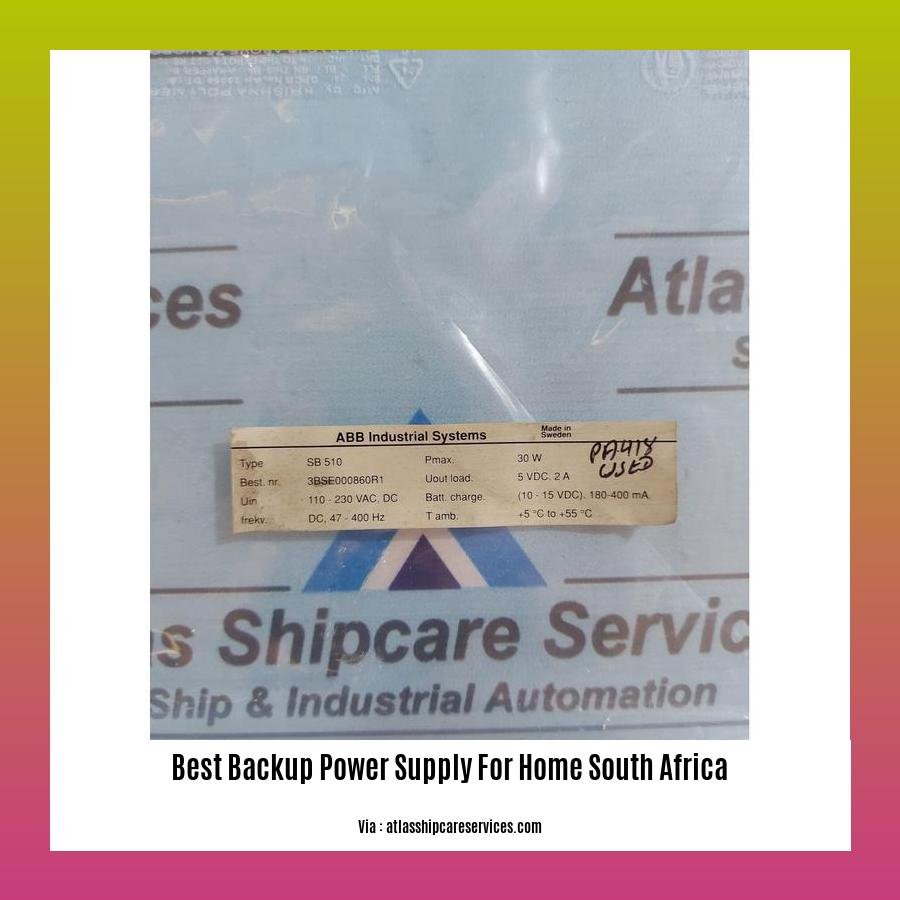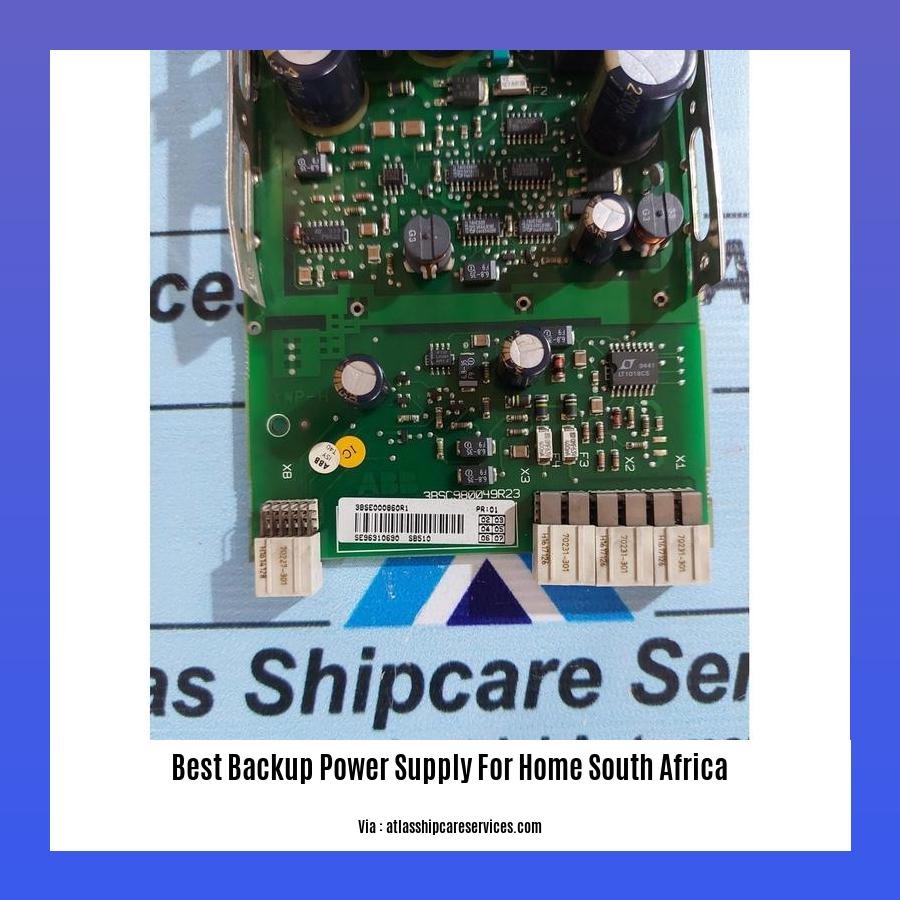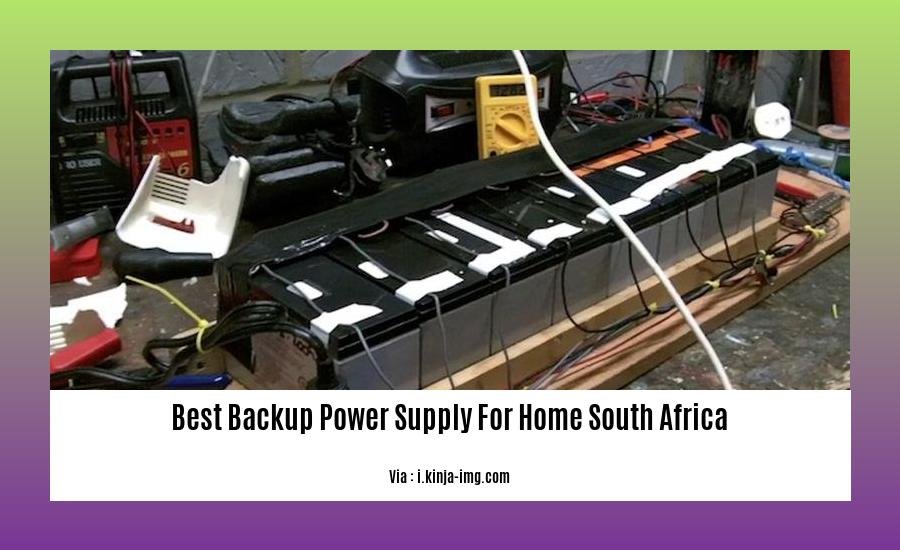In the modern era of technology reliance, having a reliable backup power supply for your home in South Africa is no longer a luxury but a necessity. With frequent power outages and unreliable grids, safeguarding your devices, appliances, and peace of mind is essential. In this comprehensive guide, we unveil the best backup power supply options available, covering types, selection criteria, installation processes, and maintenance tips. Whether you need a compact UPS for short-term power interruptions or a comprehensive whole-house generator, we’ll help you navigate the world of backup power and make an informed decision for your home’s energy needs.
Key Takeaways:
- Backup Power System Options:
- Petrol generators, diesel generators, solar panels, batteries, and inverters are available options for backup power in South Africa.
-
The best choice depends on factors like outage frequency, duration, space availability, and budget.
-
Portable Power Stations:
- EcoFlow Delta Pro: Top-rated but expensive.
- Jackery Explorer 250: Affordable option at R6,950.
-
Gizzu 500W Portable Power Station: Another affordable and compact option.
-
Backup Power Solutions for Loadshedding:
- Generators: Popular and reliable power source during loadshedding.
- Solar Power: Renewable and eco-friendly, but requires suitable installation and energy storage.
- Battery Backup Systems: Store energy from other sources for use during loadshedding.
- Uninterrupted Power Supply (UPS): Protects electronics from surges and provides temporary power during short outages.
Best Backup Power Supply for Home South Africa

South Africa’s unreliable power grid and frequent load shedding are a hassle, especially when you need uninterrupted power for work, entertainment, or medical devices. A reliable backup power supply can keep your appliances running and provide peace of mind during power outages.
Types of Backup Power Supplies
There are several types of backup power supplies available, each with its own advantages and disadvantages.
-
Generators: Generators run on fuels like petrol or diesel to create electricity. They’re powerful and can run multiple appliances, but they can be noisy and emit harmful emissions.
-
Solar Power Systems: Solar panels capture sunlight and convert it into electricity. They’re environmentally friendly and can provide power during the day, but they’re expensive to install and rely on sunny weather.
-
Battery Backup Systems: Battery backup systems store electricity from the grid or renewable sources like solar panels. They’re quiet and emission-free, but they have limited capacity and can only power essential appliances for a short time.
-
Uninterruptible Power Supply (UPS): UPS systems provide temporary power to electronic devices during short power outages. They’re ideal for protecting sensitive equipment like computers and networking devices.
Choosing the Right Backup Power Supply for Your Home
Consider these factors when choosing a backup power supply:
-
Power Requirements: Determine the total wattage of the appliances and devices you need to power during an outage.
-
Backup Time: Decide how long you need the backup power supply to run.
-
Budget: Backup power systems range in price from a few thousand rands to tens of thousands.
-
Space: Consider the space you have available for the backup power supply.
-
Installation: Some backup power supplies are easy to install, while others require professional help.
Installation and Maintenance
Follow the manufacturer’s instructions to install and maintain your backup power supply. Regular maintenance can extend its lifespan and ensure it’s always ready when you need it.
Safety Considerations
Use backup power supplies safely by following these guidelines:
-
Proper Ventilation: Ensure adequate ventilation for generators to prevent carbon monoxide poisoning.
-
Safe Operation: Operate generators outdoors and away from flammable materials.
-
Electrical Safety: Handle electrical connections carefully to avoid shocks and fires.
-
Regular Maintenance: Regularly inspect and maintain your backup power supply to ensure it’s safe to use.
With careful planning and the right backup power supply, you can keep your home powered and prepared for any power outage South Africa throws your way.
-
Stock up on the best dog supplements for homemade food to ensure that your furry companion has all the vital nutrients.
-
best excuse to work from home: Enhance work-life balance and enjoy a cozy work environment at home.
-
For a convenient and accurate diagnosis, explore the best blood test at home in Bangalore.
Installation and Setup

With South Africa’s notorious load-shedding and power outages, having a reliable backup power supply is no longer a luxury but a necessity. When choosing a suitable backup power system, it’s crucial to consider your energy needs, budget, and available space. Once you’ve made your selection, let’s delve into the Installation and Setup process:
Key Takeaways:
- Proper planning and assessment: Determine your power requirements and choose a backup system that aligns with your needs.
- Safety first: Ensure all electrical connections are secure and comply with local regulations.
- Professional assistance: Consider hiring a qualified electrician for complex installations.
- Regular maintenance: Periodically inspect and service your backup power system to ensure optimal performance.
Steps for Installation and Setup:
-
Assess Your Energy Needs:
-
Calculate the wattage of essential appliances and devices you want to power during outages.
-
Determine the total power required (in watts) to select a backup system with adequate capacity.
-
Choose a Backup Power System:
-
Research various backup power options like generators, solar systems, UPS, and battery backups.
-
Consider factors like fuel availability, environmental impact, and budget.
-
Prepare the Installation Site:
-
Choose a suitable location for the backup power system, ensuring proper ventilation and protection from the elements.
-
Ensure easy access for maintenance and repairs.
-
Install the Backup Power System:
-
Follow the manufacturer’s instructions for installation, ensuring all connections are secure.
-
Connect the system to your home’s electrical panel or dedicated circuits.
-
Test the System:
-
Conduct a thorough test to ensure the backup power system is functioning properly.
-
Check for any errors or malfunctions and rectify them promptly.
-
Regular Maintenance:
-
Periodically inspect the backup power system for signs of wear and tear.
- Clean and service the system according to the manufacturer’s recommendations.
Professional Installation and Maintenance:
For complex backup power systems like solar setups or large generators, it’s advisable to hire a qualified electrician. They can ensure proper installation, adherence to safety standards, and optimal system performance. Regular maintenance is crucial to ensure your backup power system is always ready when you need it.
[Relevant URL Sources]
- Critical Considerations When Choosing a Backup Power System
- Backup Power System Installation and Maintenance Guide
Maintenance and Troubleshooting
In the realm of backup power solutions, safeguarding your home against unexpected outages requires meticulous Maintenance and Troubleshooting. Proactive upkeep ensures optimal performance and longevity of your backup power system. Here are some crucial pointers to keep your backup system running smoothly:
Key Takeaways:
-
Diligent Upkeep: Regular inspections and maintenance prevent unexpected breakdowns and extend the lifespan of your backup power system.
-
Professional Assistance: Engage qualified electricians for complex installations and repairs to ensure safety and reliability.
-
Safety First: Adhere to safety regulations and guidelines to minimize electrical hazards and accidents.
-
Read the Manual: Familiarize yourself with the manufacturer’s instructions for proper installation, operation, and maintenance procedures.
-
Battery Care: Regularly monitor battery health, ensuring proper charging and maintenance to prevent premature failure.
-
Cleanliness Counts: Keep the backup power system and surrounding area clean and free of debris to prevent overheating and malfunctions.
-
Test Regularly: Conduct periodic tests to verify the system’s functionality and readiness during emergencies.
-
Surge Protection: Utilize surge protectors to safeguard sensitive electronics from voltage spikes and fluctuations.
Steps for Maintenance and Troubleshooting:
-
Visual Inspection: Regularly inspect the backup power system for signs of damage, corrosion, or loose connections.
-
Battery Maintenance: Check battery terminals for corrosion and ensure proper connections. Clean and tighten terminals as needed.
-
Charging and Discharging: Follow the manufacturer’s guidelines for charging and discharging cycles to maintain battery health.
-
Software Updates: Keep the system’s firmware and software up to date for optimal performance and security.
-
Troubleshooting Common Issues:
-
Power Not Turning On: Verify that the system is properly connected to the power source and that all switches are turned on.
-
Backup Power Not Engaging: Check the transfer switch to ensure it’s functioning correctly.
-
Battery Not Charging: Examine the charging system for any faults or loose connections.
-
System Not Responding to Commands: Reboot the system or check for software updates.
-
-
Emergency Contact: Keep emergency contact information for a qualified electrician or the system manufacturer readily available.
By following these Maintenance and Troubleshooting guidelines, you can ensure your backup power system is always ready to provide reliable protection during power outages. Remember, prevention is always better than cure.
[Citation]
– Eskom: Critical Considerations When Choosing a Backup Power System
– Backup Power Guide: Installation and Maintenance










